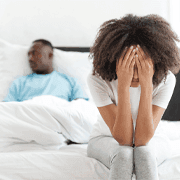Maintaining Intimacy During Haemorrhoid Flare-Ups: Tips for Couples
In This Article
Maintaining Intimacy During Haemorrhoid Flare-Ups: Tips for Couples
Sidharth
Updated on October 31, 2023
Medically verified by Dr. Arya
Fact checked by Dr. Sharon

Wellness
7 min read
Haemorrhoids can be uncomfortable, especially when it comes to intimate moments. But don't worry, we're here to help you understand and manage them.
First, let's talk about what haemorrhoids are. They're like little cushions of tissue in your back passage. They help control your bowel movements. Sometimes, they can swell or get irritated, causing what we call hemorrhoid flare-ups.
Now, why is this important? Well, it's because these flare-ups can affect your intimate activities. You might feel pain, discomfort, or even some bleeding.
It's crucial to find ways to handle this so you can still enjoy those moments with your partner.
In this guide, we'll walk you through the causes, prevention, and treatments for haemorrhoids. We'll also give you practical tips on how to keep the intimacy alive while dealing with them.
Understanding Haemorrhoid Flare-Ups
Haemorrhoids happen when there's increased pressure on the blood vessels in your back passage. Sometimes, these vessels can swell up, causing discomfort and even pain. This can occur for a few reasons:
-
Straining during bowel movements: This is a common cause. It can happen if you're constipated or if you have diarrhoea.
-
Pregnancy and childbirth: The extra pressure on the pelvic area can lead to haemorrhoids.
-
Sitting or standing for long periods: This puts extra stress on those blood vessels.
-
Being overweight: Extra weight can add pressure on your lower body.
-
Ageing: As we get older, the tissues in our rectum and anus can weaken.
During a flare-up, these swollen vessels become more sensitive and can make things like sitting or going to the bathroom a bit uncomfortable. It's like a little alarm bell going off in your body, letting you know that something needs attention.
It's not uncommon, and many people experience this at some point. So, you're definitely not alone in this. The good news is, there are ways to manage it and still enjoy intimate moments with your partner.
How Does It Impact Sexual Activity?
-
Pain and Discomfort: Haemorrhoids can bring about pain and discomfort in the anal area. During intimacy, especially during penetration, this discomfort can become more pronounced.
-
Bleeding: In some cases, haemorrhoids may cause minor bleeding. This can be concerning, but it's important to remember that it's usually not a serious issue. Still, it's something to consider during intimate activities.
-
Itching and Irritation: aemorrhoids can lead to itching and irritation around the anus. This can be exacerbated during intimate moments.
-
Decreased Sex Drive: oping with haemorrhoids can sometimes lead to a decrease in sex drive. It's a natural response when you're experiencing discomfort or pain in that area.
Managing Haemorrhoids During Sex
-
Take It Easy: If your haemorrhoids are causing discomfort, it's best to avoid having penetrative sex until they're better. This helps avoid making things worse and lets you heal up faster.
-
Go Slow and Communicate: It's important to go at your own pace. Figure out what feels good and let your partner know what works for you.
-
Find Comfortable Positions: Some positions might be more comfy than others. Experiment with different ones to see what feels best for both you and your partner. Don't be afraid to try new things.
-
Use Lubricants: Applying a water-based lubricant can make things smoother and less uncomfortable during intimate moments. It's an easy way to make things more comfy.
-
Get Help if Needed: If your haemorrhoids are causing a lot of pain or aren't getting better, it's really important to see a doctor. They can give you specific advice and treatment options tailored to you.
Treatment Options
Now, let's discuss how we can manage and treat haemorrhoids to make you more comfortable.
-
Over-the-Counter Creams and Ointments These are available without a prescription. They often contain ingredients that help reduce swelling and soothe the discomfort. When applying, be sure to clean the area gently first, and follow the instructions on the label.
-
Procedures In some cases, especially if the haemorrhoids are larger or causing significant discomfort, we might recommend a procedure. One common option is rubber band ligation. This involves placing a small band around the hemorrhoid, which cuts off its blood supply, causing it to shrink and fall off within a week or so.
-
Surgery Though it's not the first choice, in severe cases, surgery might be necessary. This is usually done on an outpatient basis, and it involves removing the swollen tissue.
-
Lifestyle Adjustments Making some changes in your daily routine can make a significant difference:
- Diet Ensure you're getting enough fibre, as it helps soften your stools. Fruits, vegetables, and whole grains are your allies here.
- Hydration Drink plenty of water to keep things moving smoothly in your digestive system.
- Exercise Regular physical activity helps with overall circulation, which can reduce the risk of flare-ups.
- Good Bathroom Habits Don't strain during bowel movements. If you feel the urge, go when you can.
- Sitz Baths Just fill a shallow basin with warm water and sit for about 15-20 minutes everyday. They can help soothe the area and reduce swelling.
5.Pain Management Over-the-counter pain relievers can help manage the discomfort. However, it's essential to follow the recommended dosage and consult if you have any specific conditions or are on other medications.
Remember, treatment options may vary depending on the severity and individual factors. It's always best to discuss with your healthcare provider to determine the most suitable approach for your situation.
 7 min read
7 min readPhysical Fitness and Sexual Health: How Exercise Boosts Your Sexual Life
 7 min read
7 min readSexually Transmitted Diseases: Types, Symptoms, Treatment
 14 min read
14 min readHow to Avoid Pregnancy After Sex
Get a Callback Now
Open Communication Is Key
When it comes to hemorrhoid flare-ups, it's crucial to have an open conversation with your partner about what you're experiencing. This might feel a bit uncomfortable at first, but remember, your partner cares about your well-being.
Creating a safe and understanding space for these conversations is key. This means listening without judgement and offering support. It's like being a good teammate – you're in this together.
Remember, talking about intimate health is perfectly normal, and it can actually bring you closer as a couple. So, take a deep breath, and when you're ready, have that important chat. It can make a big difference.
Let’s Talk About Empathy
When your partner is going through a hemorrhoid flare-up, it's important to understand how they might be feeling. They might be experiencing discomfort and even pain. This can be tough, and your support can make a big difference.
Imagine if you were in their shoes. How would you want to be treated? That's empathy – putting yourself in their place. It's like offering a helping hand when someone needs it.
Offering emotional support and reassurance can go a long way. It lets your partner know that you're there for them, no matter what. Together, you can find ways to navigate through this. So, remember, a little empathy and support can make a big difference.
Exploring Non-Intercourse Intimacy
Now, let's talk about different ways you can connect intimately with your partner that don't involve penetrative sex. This can be a great option if you're dealing with discomfort from haemorrhoids.
-
Emotional Connection: Focus on building a strong emotional bond with your partner. Share your thoughts, feelings, and experiences. This deepens your connection and can bring you closer.
-
Affectionate Touching: Hugging, cuddling, and gentle touching can be incredibly intimate and comforting. It's a way to show love and affection without any pressure.
-
Massage: Giving each other massages can be a wonderful way to relax together. It's soothing and helps you both feel more connected.
-
Shared Activities: Doing things together that you both enjoy can create a sense of togetherness. It could be anything from cooking a meal to going for a walk.
-
Open Communication: Keep talking about your desires and what feels good for both of you. This helps ensure you're on the same page and makes your intimate moments more enjoyable.
Haemorrhoids: They can affect your intimate moments, causing discomfort, pain, and other issues.
Pain During Intercourse: Go slow, try different positions, use lubricants, and consider seeking medical advice if needed.
Lifestyle Adjustments: Include fibre-rich foods, stay hydrated, and maintain good bathroom habits to prevent and manage haemorrhoids.
Treatment Options: Over-the-counter creams, procedures, and surgery are available. Consult a healthcare professional for personalised advice.
Open Communication: Talk openly with your partner about your feelings, concerns, and preferences.
Non-Intercourse Intimacy: Explore emotional connection, affectionate touching, massages, and shared activities.



